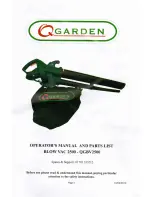
6
Children and pets must be kept away from the area of operation to
avoid injury from flying debris and contact with the snowblower.
To avoid overturning, be careful when changing the direction of the
snowblower while operating it on a slope.
Do not use the snowblower to remove snow from roofs.
The snowblower may overturn on steep slopes if left unattended,
causing injury to the operator or bystanders.
Do not use the snowblower on a slope of more than 10° (17%).
The maximum safe grade angle shown is for reference purposes
only. To avoid tipping the snowblower over, stay off slopes too
steep for safe operation. The risk of snowblower upset is even
higher when the surface is loose, wet or uneven.
Before starting the engine, check that the snowblower is not
damaged and in good condition. For your safety and safety of
others, exercise extreme care when using the snowblower up or
down hill.
If the snow discharge chute becomes clogged, stop the engine and
use a snow drop bar or a wooden stick to unclog it.
Never put your hand into the snow discharge chute while the
engine is running; serious personal injury could result.
Adjust the snow discharge chute to avoid hitting the operator,
bystanders, windows, and other objects with ejected snow. Stay
clear of the snow discharge chute while the engine is running.
09/07/24 14:47:26 32797610_008










































